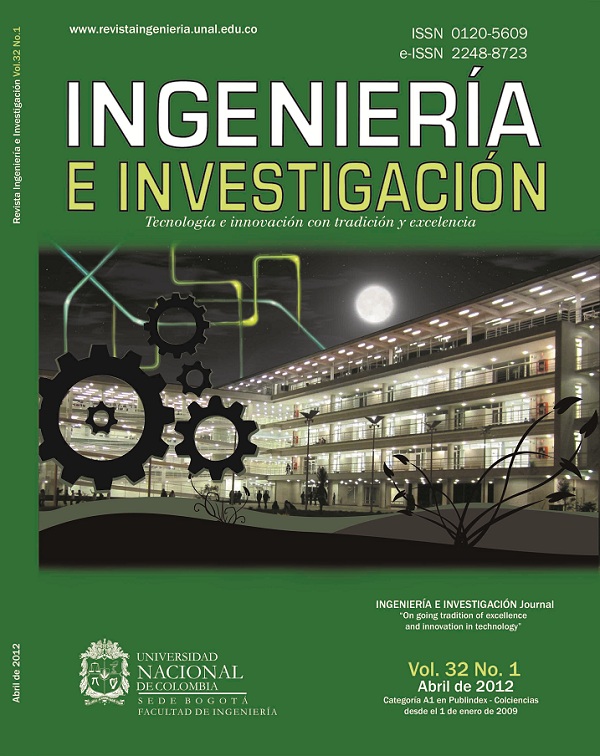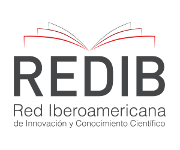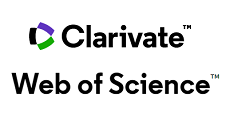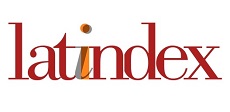Editorial
Keywords:
. (en). (es)
Downloads
Editorial
El próximo 14 de junio de 2012 concluye la administración de la Facultad de Ingeniería, que estuvo a mi cargo desde el 15 de junio de 2006; debo destacar logros muy importantes en materia de investigación, comenzando por el ascenso de la revista Ingeniería e Investigación hasta alcanzar la honrosa categoría A1 que hoy acreditamos en Publindex de Colciencias, esto nos ubica como una de las primeras revistas en investigación en ingeniería del país. El arribar a esta decorosa categoría significó un trabajo constante con mucha consagración, en primer lugar por parte de la dirección, que ha mantenido su continuidad con profesionalismo y rigurosidad científica, además de grandes principios éticos en la selección de los artículos por parte del comité editorial. Se prevén nuevas reglas para la categorización de las revistas por parte de Colciencias, cambio que no nos debe preocupar si mantenemos la exigencia académica de alta calidad de las publicaciones,
Asimismo, la Facultad de Ingeniería de la Universidad Nacional de Colombia, representada por la revista Ingeniería e Investigación, con el apoyo de la Asociación Colombiana de Facultades de Ingeniería (Acofi) y otras universidades del país, participa como gestora, desde el año 2011, de la Red Colombiana de Revistas de Ingeniería, en la que se creó un espacio de discusión sobre las políticas editoriales de publicación científica en el país. También, con Acofi realizamos el año anterior en Corferias, durante la conmemoración del Sesquicentenario de la fundación de la Facultad de Ingeniería, la Segunda Feria de Ingeniería, Expoingeniería, que convocó a todas las facultades de ingeniería en Colombia para presentar allí los resultados de los proyectos y logros científicos obtenidos por los grupos de investigación. Estas son muestras del liderazgo de la Facultad de Ingeniería en cuanto a investigación, que debe continuar desarrollando con la finalidad de contribuir a la difusión de la ciencia, la tecnología y la innovación generada por docentes e investigadores de las facultades de ingenie ría en el país y el exterior.
La Facultad de Ingeniería también manifiesta su crecimiento en el número de docentes con formación doctoral en los últimos seis años, pasando de tener 45 doctores en el 2006 a contar hoy con 86 profesores con la más alta formación académica. Se espera que al concluir el 2012 se alcance la cifra de 100 profesores con doctorado, lo cual contribuye al mejoramiento de los procesos de educación en pregrado y posgrado, investigación y extensión, con el objetivo de alcanzar la excelencia académica.
Igualmente, durante este periodo la Facultad de Ingeniería tuvo avances en materia de infraestructura, tanto administrativa como en docencia e investigación. Se construyeron 10.000 metros cuadrados y se intervinieron 5.400 más, además de la creación de tres nuevos laboratorios: Compatibilidad Electromagnética, Mecatrónica y el Laboratorio Integrado de Ingeniería Industrial. El presupuesto de inversión en equipos y en el mejoramiento de la infraestructura siempre estuvo en el rango de los 2.000 a 3.000 millones de pesos anuales, con la mira de tener vigentes la tecnología y las condiciones físicas de trabajo. No obstante, es necesario hacer esfuerzos grandes para lograr la construcción de un nuevo edificio que integre los laboratorios de la facultad con una visión de trabajo interdisciplinario.
Al cierre de esta administración, se consolidan siete programas de doctorado en ingeniería con los siguientes énfasis: Ingeniería Química, Ingeniería Eléctrica, Geotecnia, Ingeniería de Sistemas y Computación, Ciencia y Tecnología de Materiales, Ingeniería Mecánica y Mecatrónica e Industria y Organizaciones, siendo los últimos cuatro programas nuevos, creados entre el 2006 y el 2012. La Facultad también ofrece catorce programas de maestría de investigación, destacando que durante esta administración se crearon las mismas maestrías con énfasis en Profundización, acorde con los lineamientos de la reforma académica del Acuerdo 033 de 2007, del Consejo Superior Universitario (CSU). La Facultad además participa en dos programas de maestrías interfacultades: la maestría en Ingeniería Biomédica y la maestría en Ciencia y Tecnología de Alimentos. Es de destacar el trabajo colaborativo en programas de posgrados a nivel nacional de las cuatro facultades de ingeniería de la Universidad Nacional de Colombia, en las que se han desarrollado currículos que promueven el intercambio de profesores y estudiantes, así como la realización de cursos, la administración de los programas y el desarrollo de tesis y trabajos de grado en forma conjunta.
Considerando los avances logrados y la alta calidad del conocimiento generado, el siguiente paso se enfoca en la difusión científica y tecnológica, en la que debe primar el posicionamiento de las publicaciones y de los resultados de investigación de la Facultad a escala mundial, evidenciado mediante una mayor participación de nuestros profesores en las revistas científicas internacionales y dentro de los comités editoriales de ellas, así como en la materialización del conocimiento e innovación mediante la formulación de patentes y creación de empresas de base tecnológica.
DIEGO FERNANDO HERNÁNDEZ LOSADA
Dean
Facultad de Ingeniería
Universidad Nacional de Colombia, Bogotá D.C.
Editorial
The coming 14th of June 2012 sees the conclusion of the Faculty of Engineering's present administration which I have been overseeing since 15th June 2006. This gives me the chance to emphasise very important achievements regarding research which have been obtained during this time, beginning with our in-house journal Ingeniería e Investigación which managed to achieve Colciencias' hon-ourable Publindex category A1, ranking us as one of Colombia's foremost engineering research journals. Ascending to such respectable category has meant ongoing work demanding much dedication, primarily by the editorial board which has ensured the journal's continuity by adopting a most professional approach and insisting on scientific rigour and encompassing demanding ethical principles when selecting articles by the editorial committee. Colciencias is contemplating new rules for categorising journals; however, we should not be worried about such change if we maintain the high quality academic requirements demanded by national and international scientific publications.
The Universidad Nacional de Colombia's Faculty of Engineering represented by Ingeniería e Investigación, supported by the Colombian Association of Engineering Facul-ties (Asociacion Colombiana de Faculties de Ingenieria - ACOFI) and other Colombian universities, has managed the Colombian engineering journals' network since 2011, thereby creating a space for discussion about scientific publications' editorial policy in Colombia. We ran the Second Engineering Expo, EXPOINGENIERÍA, together with ACOFI last year in Corferias, during the commemoration of the 150th anniversary of the founding of the Engineering Faculty, which brought together all the engineering faculties in Colombia to present the results of research groups' scientific projects and achievements. The foregoing are samples of the Faculty of Engineering's leadership regarding research which must continue to forge ahead aimed at contributing towards broadcasting science, technology and innovation produced by teachers and investigators from faculties of engineering in Colombia and abroad.
The Faculty of Engineering's growth can be seen in the number of teachers having gained a PhD during the last six years, rising from 45 PhDs in 2006 to 86 today having the highest academic formation. It is hoped to conclude 2012 with 100 professors having been awarded their PhDs, thereby contributing towards improving formation at under- and post-graduate level, investigation and further education aimed at achieving and ensuring academic excellence.
The Faculty of Engineering has also made advances regard-ing infrastructure during this time concerning administrative matters, teaching and research. 10,000 square metres have been constructed and the running of another 5,400 has been assumed, as well as the creation of three new laboratories: electromagnetic compatibility, mechatronics and an integrated industrial engineering laboratory. The budget for investing in equipment and improving infrastructure has always ranged from two to three thousand million pesos annually, keeping technology up to date and maintaining physical working conditions. Nevertheless, greater efforts must be made to ensure that a new building is constructed for integrating the faculty's laboratories aimed at interdisci-plinary work.
7 PhD engineering programmes having the following em-phasis have been consolidated as this administration comes to a close: chemical engineering, electrical engineering, geotechnical engineering, systems engineering and computation, science and technology of materials, mechanical and mechatronics engineering and industry and organisa-tions. The last four represent new programmes created between 2006 and 2012. The Faculty also offers 14 MSc research programmes; it is worth noting that these MSc courses were created during the present administration, emphasising their in-depth nature in line with UNALCO's guidelines for academic reform (University Higher Council Agreement CSU 033/2007). The Faculty also participates in two interfaculty MSc programmes: an MSc in biomedical engineering and an MSc in food science and technology. It is worth noting the Universidad Nacional de Colombia's four engineering faculties' collaborative work regarding national postgraduate programmes where curricula have been developed promoting teacher and student exchanges, as well as running courses, administering programmes and developing joint undergraduate and postgraduate theses.
Considering the advances achieved and the high quality of knowledge and know-how produced, the following step must be focused on scientific and technological diffusion where the faculty's publications and the results of investigation must be prioritised on a worldwide scale, being confirmed by our teachers' increased participation in international scientific journals and in their editorial committees, as well as in materialisation of knowledge and innovation through formulating patents and creating technology-based companies.
DIEGO FERNANDO HERNÁNDEZ LOSADA
Dean
Facultad de Ingeniería
Universidad Nacional de Colombia, Bogotá D.C.
How to Cite
APA
ACM
ACS
ABNT
Chicago
Harvard
IEEE
MLA
Turabian
Vancouver
Download Citation
Article abstract page views
Downloads
License
Copyright (c) 2012 Diego Fernando Hernández Losada

This work is licensed under a Creative Commons Attribution 4.0 International License.
The authors or holders of the copyright for each article hereby confer exclusive, limited and free authorization on the Universidad Nacional de Colombia's journal Ingeniería e Investigación concerning the aforementioned article which, once it has been evaluated and approved, will be submitted for publication, in line with the following items:
1. The version which has been corrected according to the evaluators' suggestions will be remitted and it will be made clear whether the aforementioned article is an unedited document regarding which the rights to be authorized are held and total responsibility will be assumed by the authors for the content of the work being submitted to Ingeniería e Investigación, the Universidad Nacional de Colombia and third-parties;
2. The authorization conferred on the journal will come into force from the date on which it is included in the respective volume and issue of Ingeniería e Investigación in the Open Journal Systems and on the journal's main page (https://revistas.unal.edu.co/index.php/ingeinv), as well as in different databases and indices in which the publication is indexed;
3. The authors authorize the Universidad Nacional de Colombia's journal Ingeniería e Investigación to publish the document in whatever required format (printed, digital, electronic or whatsoever known or yet to be discovered form) and authorize Ingeniería e Investigación to include the work in any indices and/or search engines deemed necessary for promoting its diffusion;
4. The authors accept that such authorization is given free of charge and they, therefore, waive any right to receive remuneration from the publication, distribution, public communication and any use whatsoever referred to in the terms of this authorization.























